Does It Really Matter That Iran Captured One Of Our Drones? Maybe Not
While unfortunate, the loss of an RQ-170 drone over Iran may not be the intelligence disaster some make it out to be.
Micah Zenko argues over at Foreign Policy that the RQ-170 drone captured by Iran last week isn’t nearly as big an intelligence loss as the media and some pundits are making it out to be:
It is understandable that an event with headlines that include the words “Iran,” “drone,” and “nuclear” generate a great deal of attention. Yet, for all the bytes and ink expended in discussing the downed Sentinel drone, it is neither surprising nor particularly revealing. As was true in 1960, the benefits of spying on Iran outweigh the dangers of the program being revealed or a downed aircraft, and are what Americans should expect from the $55 billion spent last year on national intelligence. To understand why this downed drone is such an ordinary event requires an understanding the day-to-day process of the U.S. Intelligence Community (IC).
(…)
Since Iran is among the most important intelligence collection priority, it would only make sense for the United States to utilize its most advanced capabilities, just as the U-2 spy plane was a half-century ago. The United States has reportedly been flying drones of various capabilities and missions over Iran since as early as April 2004, some of which Iranians believed to be UFOs. The following year, Iran protested the drone flights to the United States through Swiss diplomatic channels, and via letters to the U.N. Security Council, demanding “an end to such unlawful acts.” The RQ-170 Sentinel drone itself, pictures of which were first published in 2007, had flown from Afghan airbases over Iran “for years,” according to the Associated Press. (Of course, Iran also flies surveillance drones against U.S. military assets, as demonstrated in this grainy video of the USS Ronald Reagan.)
That one of many drones dedicated to collecting intelligence over Iran has fallen into Iranian hands is also expected given the law of averages. Drones crash at rates higher than manned aircraft for any number of reasons, including due to human error, incorrect information, network interference, system failure, weather, or being shot down. As a former official warned: “It was never a matter of whether we were going to lose one but when.”
That’s worth keeping in mind. Once you put any piece of military equipment into the field, whether its an unmanned drone or more advanced night vision goggles, there’s going to be a danger that it, or some important piece of it is going to fall into the wrong hands thanks to capture, enemy fire, or good old-fashioned mechanical failure as appears to have been the case with the RQ-170. Every time we send one of these surveillance drones, or a Predator, into the field there’s always a risk that it won’t come back and that someone nefarious will get their hands on it no matter how carefully you design guidance systems, self-destruct systems, or navigation. Nothing is perfect and, in the field, the unexpected can always be expected to happen. That is the part of the calculation that the President and intelligence officials must make when deciding to utilize this technology in areas where it won’t be easy to recover an aircraft if something goes wrong.
Obviously, as Zinko notes, there is the danger that this technology will now fall into Chinese and Russian hands, but that’s happened before too. We’ve lost planes and missiles in Afghanistan over the years before 9/11, and the Chinese got access to those. During operations over Serbia in the 1990s, an F-117A Stealth Fighter was lost. It’s going to happen, but as Zinko notes in closing there’s another untold part of this story:
When the ill-fated U-2 was lost over the Soviet Union, its superior replacement, the A-12 OXCART, was already well under development at the ultra-secret Skunk Works facilities — so the U-2 was no huge loss. Similarly, the Sentinel’s downing will only be a temporary setback. As Aviation Week reported, the Sentinel’s sensor package considered “so invaluable when it debuted in Afghanistan about two years ago is considered outdated.” The hyper-spectral sensor capabilities mounted on future stealth drones will make the RQ-170 Sentinel seem quaint. When those future drones also unfortunately fall onto the territory of Iran or other adversaries, people will be surprised and unnecessarily alarmed then, too.
Unfortunate loss of an expensive and useful aircraft? Yes. Intelligence disaster? Not so much.
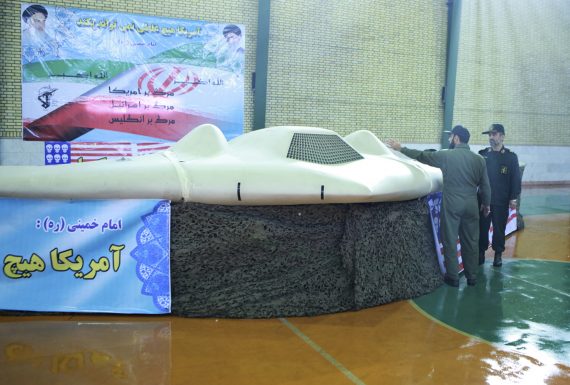

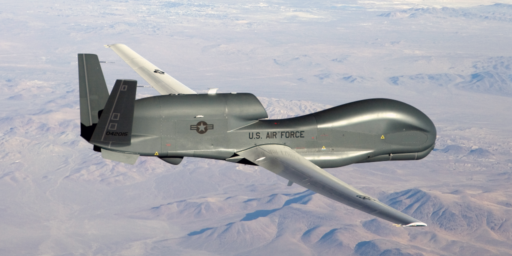
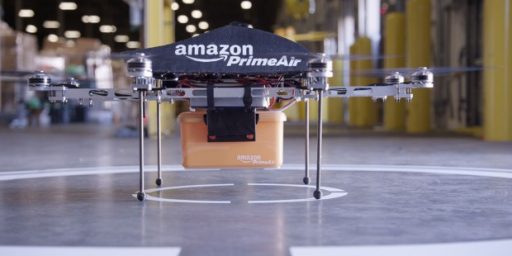

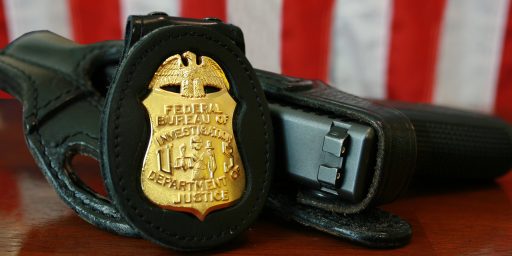
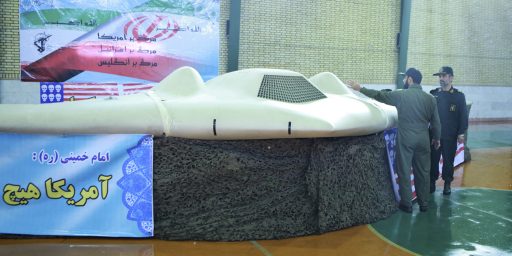
This incident gives China and Russia cover to continue to block sanctions against Iran.
Maybe Russia will resume sales of their anti-aircraft technology to Iran, too.
I’m sure drones are mostly COTS (Commodity, Off The Shelf) technology.
BTW, for those who don’t know, DIY Drones dot com
Why is Iran hiding the bottom of the drone? Was the original totaled so they are dispalying a model?
@Dan:
There are many people who have expressed skepticism about the “drone” portrayed in the photos and film provided by the Iranians.
Anytime spy tech is capture it is a big deal. Even if the technology isn’t advance, it still gives the enemy a chance to examine what we are using so they can find ways to counter it. Yes sooner or later the enemy will acquire it but the idea is to make it later.
It is already known that the enemy have hack into the drones system. There are also rumors that this one was brought down with a jammer. The Russians are known to have jammers that can affect many of our smart weapons. I am a big fan of smart weapons but have always been concern with becoming over reliant on them. There are some who think we should have all unmanned combat and intelligence gathering aircraft. IMO that would be foolish.